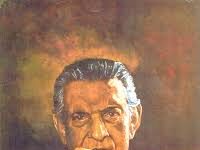
Dear Je,
I’m writing to you after having read your post, Spirituality, God, Religion. It elaborated beautifully the stances of people like me. Thank you.
Still, I have some questions.
I might be unable to express all my thoughts coherently, but I hope I convey what’s on my mind. I’m asking for your thoughts, not as a guru, but as a good friend.
1. Does one really need spirituality? What if someone is content simply with the benefits of faith, and the concept of God?
2. Does faith strengthen spirituality or does it hinder it? Sometimes, I perceive it as an impediment.
3. Is a guru imperative when exploring your spirituality?
4. How do you go about finding a guru? Do you follow them with blind faith, irrespective of their character? If that faith and your spiritual search clash, how do you deal with the resulting complications?
5. Is knowledge of the shastras a strength or an obstacle? Adi Sankara says that it stands in your way at some point.
6. Is proper training requisite for spirituality? Many a time, just mental leaps occur.
7. Is the goal of spirituality absolute mental calm? Even without trying, we sometimes reach a state of tranquility. Is that the objective? Often, the mind does not quiet, even with great effort. Why is that? Come to think of it, this should’ve been my first question.
Thanks,
Chandrasekar.
Dear Chandrasekar,
I’m responding to your questions as a friend, and a fellow traveller.
1. There is no point in asking whether spirituality is essential. Spirituality begins when one acknowledges a feeling of being hollow, of discontent. That feeling of emptiness comes with the thought, “This life is not enough for me, I’m searching for a life more wholesome,” and the realisation, “Just experiencing something is insufficient, I want to learn the experience as well.” These turn into questions, into a search for answers.
Do we control those thoughts? They crop up on their own, influenced by our dispositions and circumstances. Once formed, they never disappear.
If this hollow feeling and the compulsion to seek answers don’t take shape in a person, there really is no reason for it to be cultivated in them by someone else. Such a person would be content with what religion, and the idea of God can offer them. This isn’t something inferior; it’s not to be looked down on, it’s not less than. Everyone has their own nature, and goes through their own version of this journey called life.
I will go a step further and say that even after asking questions of spirituality, if a person can permanently avoid them, and find comfort in materialism, religion, or god, they could very well do that. It’s better to embark on your spiritual journey for no reason other than its inevitability.
2. Normally, rigid belief works against spirituality. It helps with your forward march in a worldly life, holding on to God. But that rigidity takes away the freedom required for spiritual exploration.
Spirituality expands in all directions. There can’t be any prerequisites. No precedents, no pre-training.
In Ayurveda, the patient is first thoroughly cleansed with Bermuda grass juice, purging all the medication currently in their system. Only then does Ayurvedic treatment begin.
The same principle applies to spiritual progress, albeit in a different way. Spiritual growth is not possible without relinquishing existing notions and practices. This was standard procedure in the gurukulas of old. Today, we can see J. Krishnamurthy, Osho, and the like echo the same sentiment.
But in spiritual practice, upasana is an important part. For that, absolute ‘bhava bhakti’, a form of spirituality different from worldly bhakti, is vital.
3. Spirituality, in itself, is a search; even the Upanishads agree. For that, a guru is crucial. It isn’t possible for you to understand what I speak of, until you find a guru yourself. You don’t usually lay your soul bare for others to see. But until you do, there is no true freedom for you. You need somewhere to open yourself up, and a chance to view yourself critically. To do so without a guru’s guidance is impossible.
Allopathic medicine is mass manufactured and distributed. Religions operate on the same model. Ayurvedic medicine is tailor made for each patient, concocted using the doctor’s personal understanding of the patient. Spirituality’s mode of operation is similar. It’s unique for every individual. Books cannot accomplish that. They can merely improve your qualifications.
I should also clarify that I’m not alluding to modern gurus that amass rather large followings. There’s nothing personal about that in the least.
4. Many people ask about the search for a good guru. Thirst makes us crave water. It’s the guiding force. But it does not entitle us to the discovery of water.
The relationship with a guru has two stages. One, probing and evaluating. Here, skepticism is the measure. Acceptance follows, after which faith alone can take you a long way.
Imagine going into a forest with a tribal guide. All day, we doubt, we question, and we make him justify the path he takes us on. It’s pitch black when we head back. We question nothing then. We let him lead us by our hands with unquestioning faith. Just as well, we need someone to guide us through the darkness in our spiritual journey.
The second stage, a good guru will break and build you back up anew. When his intellect slams into you, it’s excruciating. You feel like you’re losing everything that makes you who you are. In this stage, you turn hostile, in an attempt to preserve your sense of self. You look for reasons to reject your teacher. Any doubts you may have had initially, if not overcome by now, will loom large, and might just make you leave. But the loss will be yours. If you aren’t being broken, you’re not being given anything new. If you want to be coddled, treated with diplomacy, you should not expect to be shown real truth.
5. Knowledge of the shastras is necessary in the beginning. It will rightly guide us towards the essence. If you’re familiar with the iconography of a temple, you can confidently make your way straight to the inner sanctum. If it’s your first visit to a temple, you might mistake the Pushpa Yakshi statue at the tower entrance for the main deity.
In today’s world, there are many spiritual speakers, and those who proclaim to be spiritual gurus. And there are a few commercial gurus with a popular image. Most things they say are quite common; they have traditionally been repeated for a long time. We can identify such things if we had a fundamental grasp of the shastras. It’s not hard to understand how someone without that grasp would find those ideas enthralling, when such ideas have actually been commonplace for quite some time.
Similarly, without said grasp, we’re likely to consider simple ideas that casually occur to us to be rare wisdom. We’d be unaware that they’ve already been discussed extensively in tradition. We’d think ourselves blessed with rare insight, and place ourselves on a pedestal. It’s a rather dangerous illusion.
Even those who have read some of the books by Osho and J Krishnamurthy and have been exposed to those ideas aren’t safe from this false sense of insight. Knowledge of the shastras lets you see the bigger picture. It will put everything in its place.
On the other hand, fake shastras confuse us. They bind us with caste and rituals. When we don’t have any knowledge of the shastras, we might confuse those who preach fake shastras with learned people. Often, we even respect them. The caste and the religious establishments into which we are born bind us to those falsehoods. Knowledge of the real thing shows us their true value.
We see spiritual seers using their knowledge of shastras to overcome their initial doubts. Narayana Guru, who was born into a suppressed caste, used his wisdom to shrug off the manacles that society had placed on him.
But in spiritual tradition, it’s always said that shastras have to be learned and then forgotten. If you’re a scholar of poetic literature, looking at a flower with a lens of poetic grammar can’t really be called an appreciation of its beauty, can it? Spiritual experience is the same for no two people. It varies with each person and each instance. No established rule can explain or define it. You can truly appreciate poetry only when you forget and look beyond trifles like grammar. Only by forgetting the shastras you can achieve spirituality.
6. Yes, training is of the essence. But what is training? Isn’t it learning from the experience of others? How far would I get if I were to try my hand at yoga in a time before the sage Patanjali shared his wisdom on the subject with the world? Though spiritual experience is incredibly subjective, we all share quite a few common planes by virtue of being human. They have generally been defined and compiled as guidelines. They are important.
If you’re new to a town, exploring without aid, you wouldn’t know the best routes, or the right shortcuts, and you would wander all day long. A map would easily solve that problem. Sometimes, we might lack knowledge of simpler things, and that can cost us many years. This is what training will help with.
Here’s an example Nitya used. A man was meditating in his private room that was cluttered with an excess of unwanted things. When he described to Nitya the trouble he was having with meditation, Nitya went to look at his room. He told him that the clutter was affecting his subconscious. External things naturally become subliminal symbols. Things around us, just by being in sight, mould our subconscious. So, without an organized external environment, we cannot organize our internal environment. This is why Patanjali speaks of yama niyamas.
This is for the practice of yoga. But even for regular thought, we need training. I met Nitya Chaitanya Yati in the early 90s. Back then, I was obsessed with modern schools of thought. I diligently collected new theories and terminology. It was Nitya who broke that illusion.
He said, all theories and terminology, whether old or new, are just external identities. What’s important is that we adopt those identities to suit us, and express what we experience and think. It’s for professors, not thinkers, to learn and teach new theories and nomenclature. Art and spirituality are about new experiences and a fresh understanding; they’re about trying to express that understanding.
Our thoughts are susceptible to many such missteps. Only the right training will set us straight. It is for this that gurukulas have been established through the ages.
7. If you were to ask a researcher whether he finds tranquility in his research, what would his response be? When that’s the case for something as objective as science, how can there be peace in the subjective quest that is spirituality?
Spirituality intended for calming the mind is entirely different; it involves clinging to spirituality just to distance oneself from worldly concerns. Bhakti will serve that intent well. As will the fundamentals of meditation.
There is a kind of peace in spiritual quest. It’s the contentment that comes with the realisation, “I’m doing right by myself.” Like pulp that’s separate from the rind, it’s the peace of mind born of insulation from materialistic turbulence.
But even the stages of spirituality are not free of turbulence. Yogic practice begins with no focus. But when focus does arrive, it does not do so alone. Turmoil follows. All planes of its existence are rife with complications. There’s nothing more to be said about that.
Je











